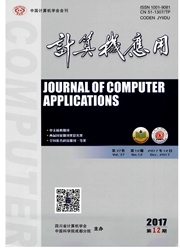

 中文摘要:
中文摘要:
针对可充电无线传感网络中的能量均衡路由问题,提出在稳定功率无线充电和监测数据收集网络场景下的多路径路由算法和机会路由算法,以实现网络的能量均衡。首先,通过电磁传播理论构建了无线传感节点的充电和接收功率关系模型;然后,考虑网络中无线传感节点的发送能耗和接收能耗,基于上述充电模型将网络能量均衡的路由问题转化为网络节点运行时间的最大最小化问题,通过线性规划得到的各链路流量用以指导路由中数据流量分配;最后,考虑一种更加现实的低功耗的场景,并提出了一种基于机会路由的能量均衡路由算法。实验结果表明,与最短路径路由(SPR)和期望周期最短路由(EDC)算法相比较,所提出的两种路由算法均能有效提高采集能量的利用率和工作周期内的网络生命周期。
 英文摘要:
英文摘要:
Aiming at energy-balanced routing problem in rechargeable Wireless Sensor Network (WSN), a new multi- path routing algorithm and an opportunistic routing algorithm were proposed in the scenario of wireless charging with stable power and monitoring data collection network, so as to achieve the energy balance of the network. Firstly, the relationship model between the charging power and the receiving power of wireless sensor nodes was constructed by the theory of electromagnetic propagation. Then, considering the sending and receiving energy consumptions of wireless sensor nodes in the network, the energy-balanced routing problem was transformed into the max-min optimization lifetime problem of the network nodes. The link traffic obtained by the linear programming was used to guide the data flow allocation in the routing. Finally, considering a more realistic scenario of low power WSN, an energy-balanced routing algorithm based on opportunistic routing was proposed. The experimental results show that, compared with the Shortest Path Routing (SPR) and Expected Duty-Cycled wakeups minimal routing (EDC) algorithms, the proposed two routing algorithms can effectively improve the utilization ratio of the energy collection and the network lifetime in the working period.
 同期刊论文项目
同期刊论文项目
 同项目期刊论文
同项目期刊论文
 期刊信息
期刊信息
